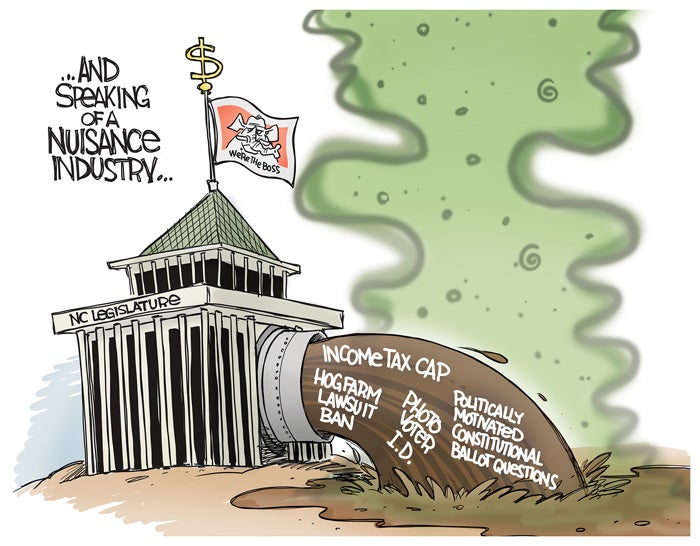Colin Campbell: Key details missing from NC constitutional amendments
Published 5:27 pm Monday, July 23, 2018
RALEIGH — In what will be the biggest demonstration of direct democracy in North Carolina since 1970, voters this November will decide the fate of six different changes to the state’s constitution — ranging from a voter ID requirement to a reduction in the governor’s appointment powers.
In a state where legislators run in gerrymandered districts, a constitutional referendum can help determine what a majority of voters really want. But there’s one major problem with this year’s approach: The details of how the amendments would work won’t be available until after the election.
Essentially, state lawmakers are trying to sell you a car, but they’re refusing to unlock the doors and let you check out the the dashboard.
Take the voter ID amendment, which would add just two sentences to the constitution: “Voters offering to vote in person shall present photographic identification before voting. The General Assembly shall enact general laws governing the requirements of such photographic identification, which may include exceptions.”
But what are those exceptions? And what would be a legit photo ID for voting? Would I need an official driver’s license or passport, or could I get by with a Costco membership card that has my picture on it?
If the amendment passes, a lame-duck legislature will return to Raleigh after Thanksgiving to answer those questions. Legislative leaders were unwilling to settle those issues in the original amendment bill, but they also weren’t willing to wait until January when newly elected lawmakers will take their seats.
That’s not how constitutional amendments usually work, according to Gerry Cohen, a retired legislative staffer and the unofficial historian laureate of state politics. Cohen found that of the last 16 constitutional amendments in North Carolina, only one didn’t have the “implementing legislation” approved prior to the election. We haven’t had so many amendments on one ballot since the 1970 election.
I’m not sure how many voters would read the fine print if it was available. But it’s nice for those of us who are diligent about our civic duties to have the opportunity.
As it stands, the uncertainty over the amendments has given Democrats fodder for a “Nix All Six” campaign. I’m not sure it’s smart strategy to campaign against some of the less controversial amendments — such as the one protecting hunting and fishing rights — but the memorable slogan saves the party from having to explain which amendments are objectionable and why. Democrats are instead selling “Nix All Six” as a way to restrain what they consider a power-hungry GOP legislature.
But only two of the six fit that description — the one giving the legislature more power over judicial vacancies and the one stripping the governor’s role in appointing the elections board and other state boards.
The other four — voter ID, capping the income tax rate at 7 percent, hunting and fishing rights, and an expansion of crime victims’ rights — might have broader support, particularly if lawmakers were more transparent about the details.
Most of us support hunting and fishing, but would the amendment strike down existing regulations about when and where you can hunt?
The victims’ rights proposal, known as Marsy’s Law, is the most detailed proposal and would ensure that victims are looped into legal proceedings. But it has prompted some concerns from court officials and possible unintended consequences.
Confused? An obscure commission is here to help by writing explainers and ballot captions. A little-known law gives that power to Secretary of State Elaine Marshall, Attorney General Josh Stein and Legislative Services Officer Paul Coble. They’re meeting soon to translate the legislative lingo into language that hopefully will better explain the amendments.
But this intrepid trio won’t have access to the details that lawmakers might consider in late November. House and Senate leaders should at least offer us a preview of that legislation before we agree to vote “yes.”
Colin Campbell is editor of the Insider State Government News Service. Write to him at ccampbell@ncinsider.com.


